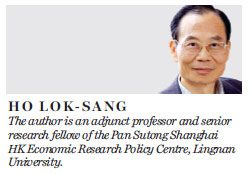Surplus prediction may be wrong
Updated: 2016-02-25 08:29
By Ho Lok-Sang(HK Edition)
|
|||||||
The latest Budget may be overly optimistic about the fiscal position in the new fiscal year.
Financial Secretary John Tsang Chun-wah has told us he expects a fiscal surplus of about HK$11 billion in 2016-17. This is probably too good to be true, given a down-trending economy, falling house and land prices, and lackluster asset market prices and transactions. From past data, I have observed a very close relationship between housing prices and Hong Kong's fiscal revenue. Now that housing and land prices are falling, we can expect all major revenue sources to be subject to downward pressures in the new year - profits tax, revenue from land auctions and land premiums paid for land use conversions, and stamp duties. Whereas the government had been overly conservative in estimating revenue intakes in the past, this time it could be being overly optimistic.
If the revenue picture is indeed as rosy as suggested, then I really do not see why we should limit our recurrent healthcare spending growth to only 1.2 percent in real terms. The government has noted that healthcare spending increased 90 percent in the 10 years to 2016-2017, but this is not overly generous. This is exactly what is warranted. Our population is increasing at about 1 percent a year, and our elderly population over the age of 65 is increasing at about 1.4 percent a year. Since members of the elderly population generally require about five times as much healthcare as the average person, we should devote more resources to healthcare. Moreover, given recent advances in medical know-how, additional spending can really improve quality of life. A previous survey of mine shows that Hong Kong people are willing to pay more tax in order to get better healthcare.
I was told at a Budget briefing by the secretary for financial services and the treasury that the Hospital Authority is trying hard to raise productivity and any resources saved will be plowed back into healthcare. But I am worried that the productivity gains to be squeezed out of the system might carry a heavy human cost. Many doctors and nurses in the public sector are already overworked and stressed out. The high death rate following surgical operations in Tuen Mun was said to be possibly related to an excessive workload. Many public hospitals often have a bed occupancy rate of over 100 percent. Trying to squeeze productivity gains year after year could backfire. If people are demoralized they may leave for private sector opportunities, leaving the needy behind. Thus, healthcare spending needs to be raised, even if additional taxes or charges have to be imposed. For years I have been advocating raising charges on healthcare services provided by the public hospitals, while capping the annual eligible healthcare expenses for each individual or each household. This is not difficult to do, but the government needs to have the courage to press for change.
I am pleased with the various tax relief measures proposed, especially for the middle class and for small-and medium-sized enterprises (SMEs). The middle-class salaried workers who have to pay salaries tax will be happy with the tax relief, involving a one-time cut as well as an increase in tax allowances. Similarly the tax relief for SMEs and the support for them to adopt new technology are welcome.
Some politicians have been calling for a tax on dividends and on capital gains for some time now. This proposal will be difficult to justify if profits are already fully taxed. This is because a dividend tax and a capital gains tax would involve double taxation. However, if we reduce the profits tax rate to one half of the current rate, a tax on half of dividends collected and realized capital gains over an inflationary gain allowance could be justified. I think lowering the profits tax rate will be welcomed by the business sector and will enhance Hong Kong's competitiveness. Many members of the public have been complaining about massive dividend collections by some wealthy people that have been entirely tax free. Reducing profits tax will stimulate investment and research input, and help create jobs.
I also congratulate the government for having introduced the much sought-after iBond, and proposing Silver Bonds and Green Bonds. For elderly people who need a stable source of income, Silver Bonds are greatly welcomed. From the popularity of the disastrous Lehman "minibonds", we can see that there is much demand for fixed income products that offer financial security. Given the need to protect our environment and to avert climate change, the proposal of iBonds to fund environmental infrastructure is not only welcome in Hong Kong but around the world.
Similarly, the great effort made by the SAR government to push research and development (R&D) and to promote the smart city is most timely. Low R&D has been Hong Kong's weakness for quite some time. Thanks to promotion by the government and the entrepreneurial spirit of many young people in Hong Kong, vibrant startup activities have emerged recently which may make Hong Kong a center of innovation and entrepreneurship. The injection of funds to boost infrastructure and R&D in our science park will bear fruit for generations to come.

(HK Edition 02/25/2016 page5)